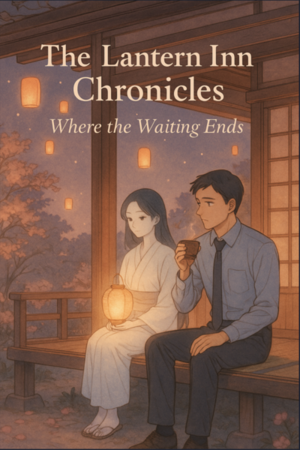Chapter 10:
The Inn With Only One Door
Lantern Inn Chronicles
The rain had stopped.
Dew clung to the edges of leaves like quiet punctuation marks, the earth still slick with memory. Morning light filtered softly through the washi paper windows, not like a blaze, but a hush — slow and golden, reverent. The air inside the Lantern Inn was so still it seemed to listen. It was the kind of silence that made the walls feel less like wood and more like a shrine — sacred, grieving, and warm in its stillness.
Kaito rose before anyone else.
Maybe it was habit — the discipline of an old life still echoing through his limbs. Or maybe it was something deeper, something quieter. A form of guilt that didn’t speak in words but stirred in his bones when the world was still.
He didn’t rush. His movements were deliberate, ceremonial. He padded barefoot across the polished floorboards, feeling the cool grain beneath his soles. The hallway yawned out in front of him, dim and expectant.
He lit the lanterns one by one — small flames blooming in their glass chambers. Each flame felt alive, almost sentient. They did not hiss or crackle. They simply appeared, like they knew who they were burning for. Like they had waited to be needed.
When he reached the last lantern at the far end of the hall, he paused.
There was something folded beneath its base.
A note — small, square, creased at the corners. Folded with care, the way only someone young or very lonely folds things.
Kaito hesitated, then opened it.
“Thank you, Moriyama-san. For calling me Ken-chan. I’m not afraid anymore.”
The words weren’t shaky. They weren’t desperate. They were still.
Kaito didn’t cry. He hadn’t cried in years — not when his father died, not when he left his last job, not when the silence of his own apartment began to feel like punishment.
But this… this was different.
This note didn’t make his eyes sting.
It made his chest ache — a deep, slow ache, like something pressing from within. The kind of hurt that comes not from sorrow, but from having breathed in someone else’s pain so completely that it began to live in you too.
Kenta had vanished.
There was no sound. No farewell. Just the quiet imprint of a soul that had passed through.
His room was folded neatly. The futon was perfectly arranged, the pillow smoothed flat. The bell-charm that had once sat at its corner was gone.
It was how all the guests left — quiet and clean, as if they had never been there at all.
Except they had.
They always had.
Kaito stood in the doorway for a long time, as if the empty room might still speak to him. It didn’t. But the silence it left behind felt like a handprint on his back — not cold, not warm, just… real.
He walked back down the hallway. The wood beneath his feet creaked faintly, not in protest, but in memory. Every board seemed to carry the weight of someone’s passage.
Later that day, he sat with Emi in the overgrown garden.
They sipped roasted tea beneath the crooked pine. The steam spiraled gently in the air between them. Around them, the wind combed through the trees, whispering old lullabies in a language neither of them spoke but both understood.
Kaito stared out over the moss-covered stones and asked, not quite looking at her, “Why is there only one door here?”
He hadn’t expected an answer. It was the kind of question that feels like it drifts out of your mouth not to be answered, but to make space for silence to sit beside you.
But Emi turned.
She didn’t speak at first. Just smiled — the kind of smile that wasn’t for show. A smile worn like a memory: frayed, familiar, quietly aching. It was a smile that said she had been here longer than anyone remembered, longer than the inn itself, maybe. That she had watched hundreds of souls arrive and leave, and she had learned not to chase them — only to wait.
“Because those who come here,” she said finally, voice low as moss and soft as the breath between bells, “aren’t looking for a way out.”
She tilted her head, eyes reflecting the still water of the koi pond.
“They’re waiting for a way in.”
A pause. The wind stirred.
“A way to be seen.”
As if to echo the moment, a lone cherry blossom petal drifted downward. Emi reached out, her fingers slow and reverent, and caught it just before it touched the pond’s surface — like catching a final thought before it disappeared into silence.
She held it for a moment, then let it go.
“And when they’re ready…” she said, almost to the breeze itself, “the door opens. Always.”
Kaito didn’t reply.
He didn’t need to.
But something deep within him — something quiet and unused and long-shuttered — softened. As if the door she spoke of had already begun to creak open inside his own chest.
That evening, the Lantern Inn welcomed its next guest.
Not a child this time.
An old woman.
She arrived just after twilight, walking as if she were remembering how. Her spine was bowed, her steps slow, but she carried herself with an invisible thread of grace — like an aging scroll that still held sacred verses in its faded lines. Her cane, carved with tiny stars, tapped a rhythm as she stepped onto the porch. Each star had been worn smooth by time and grief, but they remained. She wore a lavender kimono that had clearly once been vibrant, now dulled with years and care, its fabric thin in places. The scent that clung to her was soft — jasmine mixed with old paper and a trace of rain.
Her hair was tied into a trembling bun, wisps curling like breath at her temples.
Her lipstick was too bright — bold red, like a memory trying not to fade. Not because it matched, but because someone once told her she looked beautiful in it. She had worn it for him. And never stopped.
Kaito met her at the threshold.
She didn’t look at him.
She looked through him.
Not out of rudeness, but out of that ancient exhaustion that comes from being invisible for far too long — the kind of looking that has nothing left to pretend.
“Is this where forgotten people go?” she asked, her voice not trembling, but carrying a quiet defiance. The defiance of someone still standing.
Kaito nodded. His words came gently, like footsteps on temple stones.
“If they wish to be remembered again.”
Her lips quivered, holding back something heavier than sadness. A silence shaped by decades.
She stepped inside.
He placed her in Room Four — the room with soft tatami, deep shadows, and a single photograph on the wall. A black-and-white image of a lake beneath a sweeping sky, clouds billowing like unspoken words. Most guests passed it by without noticing.
But she didn’t.
She stopped.
Her cane hesitated.
Her breath caught — not from pain, but from sudden recognition.
“My husband proposed to me under that sky,” she whispered, not to Kaito, but to the air itself. To time.
That night, he brought her tea.
She sat by the window, lit only by moonlight, her hands wrapped around the porcelain cup as if it held something more than warmth.
“I lived eighty-two years,” she said softly, almost as if recounting someone else’s story. “And in the last ten… not a single one of my children asked me what my name meant.”
She sipped, eyes fixed on the garden.
“It means ‘to bloom after frost.’ My mother gave it to me the winter I was born. She said I’d live a hard life… but I would smile anyway. Like plum blossoms on snow.”
Her voice faltered.
“But I forgot how to smile.”
She turned to him, slowly, her expression caught between apology and longing.
“I forgot my own face.”
Kaito didn’t move at first.
Then he knelt beside her, quietly. As if joining her grief without stepping on it. His hand hovered, uncertain, then settled around hers.
Her skin was paper-thin. Warm. Human.
“You’re still blooming,” he said, barely above a whisper.
For a moment, the old woman didn’t move.
Then — like spring breaking through frost — something shifted in her. Her shoulders dropped. Her eyes welled. Not from sorrow.
From recognition.
From the soft, shattering relief of being seen.
Tears rolled down her cheeks without a sound. The kind of tears that no longer needed to explain themselves.
Outside, the lantern outside Room Four flickered long after the others had dimmed.
By morning, she was gone.
The room was perfectly in place — futon folded, tea cup rinsed, windows closed. As if she had never been there.
But something had changed.
The photograph above the futon… was no longer the same.
The lake remained.
The sky still stretched wide.
But now, beneath those clouds, two tiny figures stood hand-in-hand — unmistakably her and the man she once loved.
Both smiling.
As if finally home.
Flashback: Kaito, Age Sixteen
It was the only time he had ever raised his voice.
His sister, annoyed, had called him invisible — not in cruelty, but carelessness. As if the word didn’t mean anything at all.
And Kaito, tired of swallowing everything whole, had snapped.
“I stay quiet because someone has to!” he had shouted, chest heaving.
She had stared. Confused. Maybe even hurt.
She didn’t understand.
No one ever did.
After that, he never raised his voice again.
But in that moment — for the first time — he had felt visible.
Present
Sunrise came quietly.
The Lantern Inn stirred in golden hush.
Kaito stood before the inn’s one door — the door that never creaked, that opened only when it was meant to. The door no one forced. The one that waited for the heart to decide.
He opened it.
Just once.
The world outside stretched vast — the sky streaked with blush pinks and feathered golds, the clouds soft as memory.
He didn’t step through.
But for the first time since arriving at the Lantern Inn…
He wanted to.
Not to leave.
But to arrive.
Within himself.
And it was enough.




Please sign in to leave a comment.